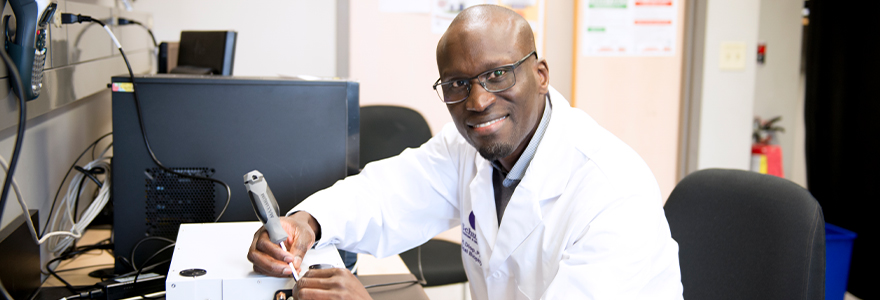Funding fuels medical technology innovation for remote and low-resource communities

Mamadou Diop, PhD, is leading one of several newly funded research projects that tackle healthcare challenges in remote and low-resource settings.
By Communications
Researchers at Schulich Medicine & Dentistry are collaborating across disciplines – and continents – to fuel medical technology advancements that will improve health care in remote and low-resource communities around the world.
Nine research projects have received catalyst grant funding through Western University’s newly established Frugal Biomedical Innovations program to develop innovative solutions for a wide range of health-care challenges, from malaria diagnosis to quality of life for disabled individuals.
Mamadou Diop, PhD, assistant professor in Medical Biophysics, is one of the inaugural grant recipients. He is developing a low-cost, wearable device for detecting brain injury in pre-term babies.
Pre-term babies are particularly vulnerable to brain swelling and inadequate blood flow. But current non-invasive monitoring techniques, such as near-infrared spectroscopy, are often out of reach in remote and low-resource areas of the world.
“Neonatal brain injury is a major concern in under-resourced communities, and we know that early signs of brain injury can be detected by cerebral monitoring of blood oxygenation,” said Diop. “Our goal is to develop a low-cost, wearable device that is less expensive, can function using very low power, and can be operated by a minimally trained person.”
Diop is collaborating with David Holdsworth, PhD, as well as researchers at Cheikh Anta Diop University in Senegal, on the project.
The Frugal Biomedical Innovations program is a multidisciplinary initiative, housed at the School of Biomedical Engineering, that facilitates the design, development and deployment of innovative medical technologies in remote and low-resource communities. The catalyst grants provide funding to Western investigators and their partners in Canada, Ethiopia, Uganda and/or Kenya, supporting innovations in health-care diagnosis and therapy.
Congratulations to the School’s 2023 recipients:
Ian Cunningham, PhD
High-Quality Fourier Microscope for Point-of-Care Malaria Diagnoses
Mamadou Diop, PhD
Wearable neonatal cerebral oximeter for low resource settings
Maria Drangova, PhD
Low-cost material testing system for biomedical engineering educational programs
Dr. Noha Gomaa
Towards Sustainable Dentistry: A Non-invasive, Low-Cost, Rapid Screening Test for Oral Inflammation and Periodontal Disease
Jennifer Guthrie, PhD
Innovative Technology for Rapid TB Antimicrobial Resistance Detection
David Holdsworth, PhD
Low-cost x-ray quality assurance system for low-resource settings
Dr. Tarek Loubani
Validation of a high-quality low-cost (frugally designed) open-source electrocardiograph;
Design and Development of Assistive Devices for Developing Countries: Using 3D-printed hands and legs to improve quality of life for disabled persons in Ethiopia
Dr. Michael Rieder
Development of a Non-invasive System to Count and Characterize Blood Cells
Funded through the Faculty of Engineering:
James Lacefield, PhD (research partners Drs. Abbas Jessani and Noha Gomaa)
Smart Toothbrush and Tele-Dentistry System to Promote Oral Health in Kenya









